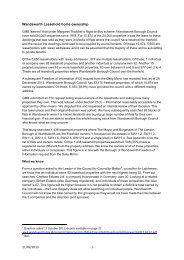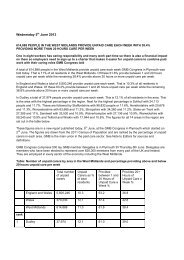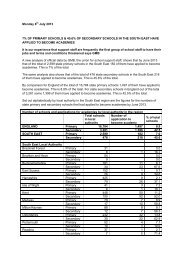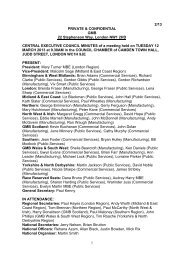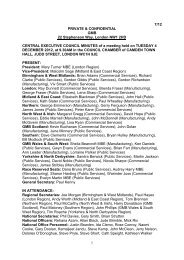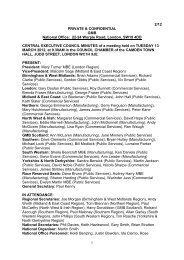WO toolkit 2012 complete.pdf - GMB
WO toolkit 2012 complete.pdf - GMB
WO toolkit 2012 complete.pdf - GMB
You also want an ePaper? Increase the reach of your titles
YUMPU automatically turns print PDFs into web optimized ePapers that Google loves.
SECTION 5.44<br />
44. Can my union represent me in a grievance or disciplinary hearing?<br />
Workers have the right to be accompanied at grievance and disciplinary hearings and appeals,even if<br />
their employer does not recognise their union(see also 31.Can I Be Represented In A Disciplinary<br />
Hearing?).<br />
This right is available to all workers(including agency and home workers)regardless of the number<br />
working for their employer.<br />
The companion can be:<br />
• A union lay official certified as experienced or trained in representing workers;<br />
• a trade union officer; or<br />
• another of the employer’s workers.<br />
The right applies to any disciplinary hearing which could result in a formal warning,or in the employer<br />
taking some other action e.g.dismissal,suspension.<br />
The grievance must concern the performance of a duty owed by an employer to the worker i.e.any<br />
common law,contractual or statutory duty.So a grievance over unlawful pay discrimination would be<br />
covered,but usually not a request for a pay rise.<br />
The right also applies to appeal hearings for disciplinary and grievance matters.<br />
The request to be accompanied must be‘reasonable’,so do not leave it until the last minute.It is best,<br />
though not obligatory,to put it in writing.<br />
Your companion can represent you by:<br />
• Addressing the hearing to put your case(including questioning management and witnesses),<br />
summing up your case and responding on your behalf to any view expressed at the hearing.<br />
• Confer with you during the hearing.<br />
Your companion cannot however:<br />
• Answer questions on your behalf,<br />
• address the hearing if you indicate that you do not want him/her to do so,<br />
• use the powers in way that prevents the employer from explaining their case or prevents anyone<br />
else at the hearing from making their contribution to it.<br />
If your companion is not available,you can ask for the hearing to be postponed.The alternative slot<br />
must fall within five working days(excluding Saturday,Sunday,Christmas Day,Good Friday and bank<br />
holidays).So a hearing set for Monday can be postponed up to,but not beyond the following Monday.<br />
The companion is allowed reasonable paid time off,including conferring with you before and after the<br />
hearing.<br />
If an employer refuses to allow you to be accompanied,or to postpone a hearing,you can complain to<br />
an Employment Tribunal,which can award up to two weeks’pay.A dismissal in these circumstances may<br />
well be unfair.<br />
Workers and their representatives are protected from dismissal or action short of dismissal for<br />
exercising or trying to exercise the right to be accompanied.<br />
REMEMBER: there may be more than one person affected by this issue.<br />
Consider calling a meeting to advise,recruit and organise.



